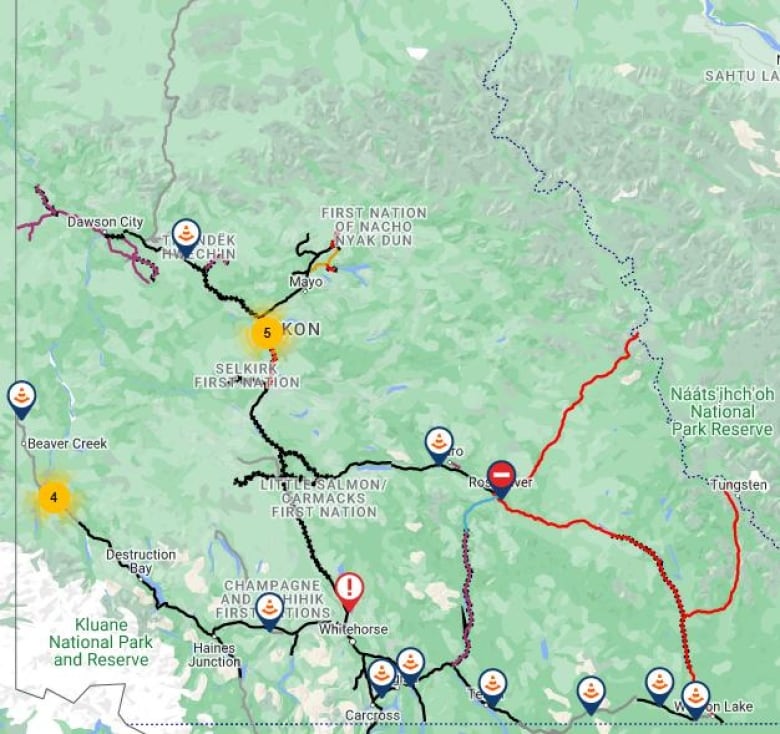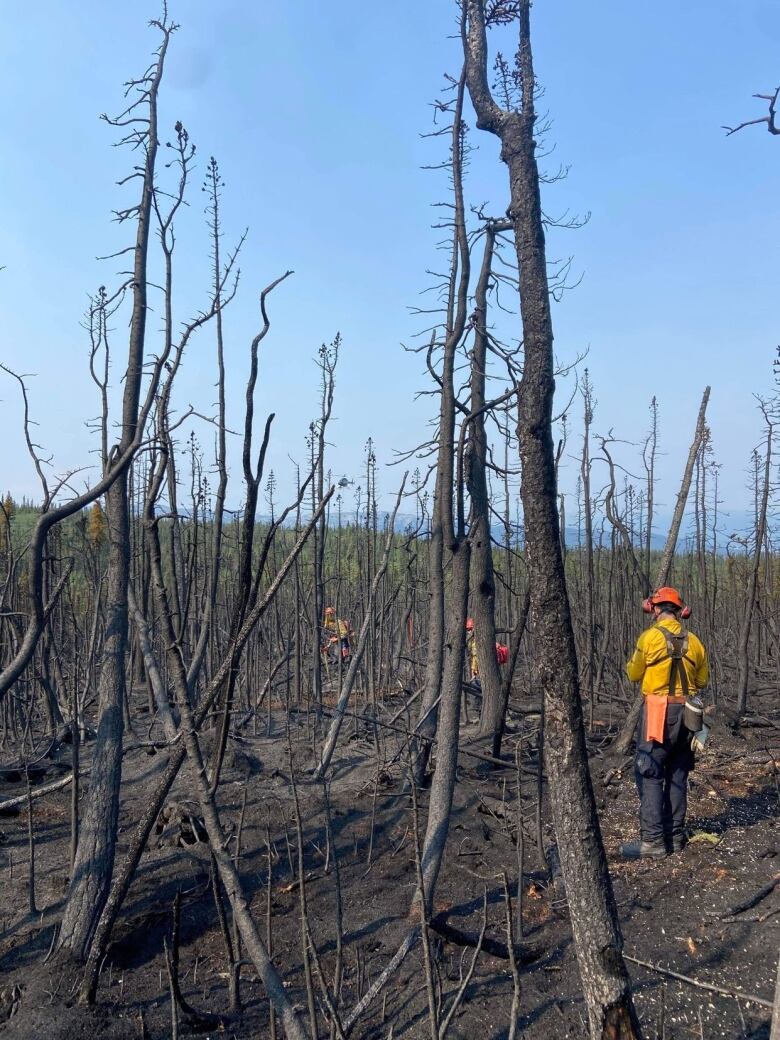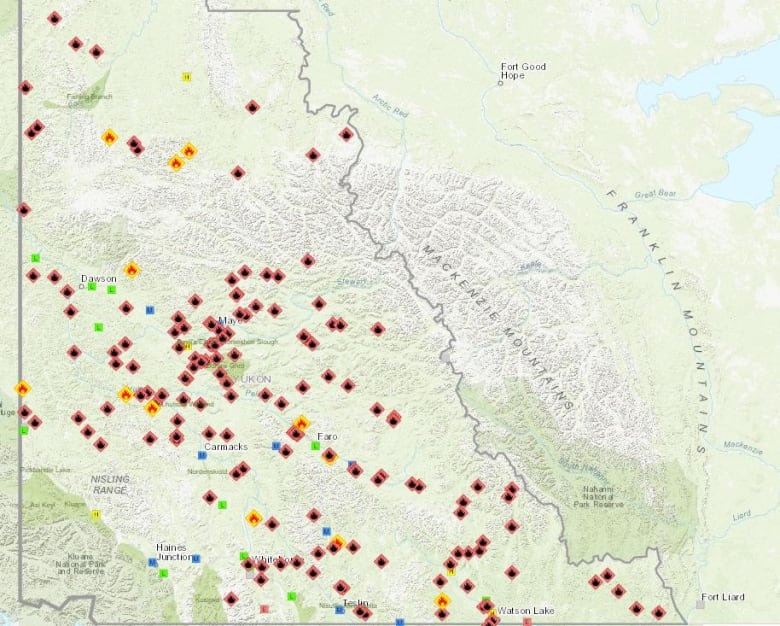Yukon issues travel advisory as wildfires, floods stretch already scant resources
The territory is dealing with 160 active wildfires as of Friday, more than it's had in entire wildfire seasons

Yukon residents and visitors are being asked to "seriously consider" their travel plans in the midst of wildfire- and flood-related road closures as well as evacuation alerts.
The territorial government issued a Yukon-wide travel advisory Friday, stating that wildfires and flooding, along with widespread telecommunications interruptions and poor air quality, have challenged the territory.
Appearing on CBC's Midday Cafe, Richard Mostyn, territorial minister of Community Services, said "the message is for everyone to take a bit of personal responsibility this summer."
He asked that Yukoners "take a good hard look at their travel plans," and if they're not necessary, don't travel.
With over 160 active wildfires — more than Yukon has had over entire past wildfire seasons — Mostyn said this could be one of the territory's worst wildfire seasons.
"The situation in the territory right now is extreme," he told host Leonard Linklater, listing fires active in central Yukon, in Watson Lake, Dawson City and near Beaver Creek.
Most years, he said, Yukon has about 100 firefighters on the ground.
This year, with support from other parts of the country, it's close to 300 firefighters and resources are still being stretched.

If residents do travel, the government is asking they be prepared for an emergency situation and understand that the situation could change quickly.
The travel advisory recommends always having water, food, cash, extra gas and other emergency supplies in order to be self-sufficient and not have to pull from emergency resources.
"Make sure you can look after yourself if you get, perhaps, stranded because of an event on the highway," Mostyn said.
"There's a lot going on right now and our resources are really maxed out. So we're asking people to please help our Wildland Fire people, our emergency response folks."
He said that tourists would still be coming in from out of the territory but advised that they watch for updates on road conditions and closures and "perhaps alter plans to where it's a little bit safer and where there's less crises going on."
'It looked like cars were disappearing into whiteness'
Kelsey Kerr was in one of the cars that was trying to cross the Klondike Highway, which remains closed from Stewart Crossing to Pelly Crossing.
She tried first on Tuesday but was turned away by the pilot car after a two-hour wait. Kerr, along with those accompanying her on the drive, spent the night in Dawson City and tried again Wednesday.
Before travelling the highway, Kerr said the pilot car told them to keep their headlights and hazard lights on, take their time and not pass the car ahead.
Despite the smoke not being "super thick," Kerr said she couldn't see past 10 or so cars ahead and there were points where she couldn't see the horizon.
"It just looked like cars were disappearing into whiteness," she said.
On the drive, Kerr said there was ash falling from the sky and that the heat from outside was building in the car. Though the windows were rolled up, she said there were points in the drive that the air quality caused coughing fits for everyone in the vehicle.
On both sides of the highway she said there were some trees still on fire, others completely burnt ,"so just black sticks," and that the ground was smoking.
"It's definitely going to change the landscape for sure," she said, adding that "for anyone who enjoys morel picking, it's probably going to be a prime spot next year."

Through the drive, Kerr said she was trying to stay positive but was thinking about what might happen if the wind changed and re-ignited the flames.
Kerr said she had a lot of respect for firefighters, highway crews and those working on the telephone crews considering "even driving through it wasn't a comfortable situation."
She acknowledged that avoiding travel can be difficult for residents of some Yukon communities that rely on Whitehorse for medical appointments or may need to travel for groceries, but "if you're not needing to go anywhere … just stay at home," she said.

Updates on evacuation alerts, flood warnings and air quality advisories can be found at Yukon.ca/emergencies.
Changes to road conditions will appear on Yukon511.ca.
For current wildfire information, go to Yukon.ca/get-wildfire-updates or call 867-393-7415.
With recent internet outages causing communication disruptions, Mostyn said when there is an emergency alert in effect, the department has people going door to door in communities "to make sure people are informed" and "know what will happen if an evacuation alert is issued."
"These are really really extraordinary times in the territory," he said.
With 210 total fires in the territory this year, the emergency measures organization is reminding residents about the risk of poor air quality.
"When there is heavy smoke, all people are at risk regardless of their age or health status," the advisory states.
"Whether you are in a community or travelling on the land, you need to understand how poor air quality due to wildfire smoke can affect your health."
With files from Leonard Linklater and Anna Desmarais

